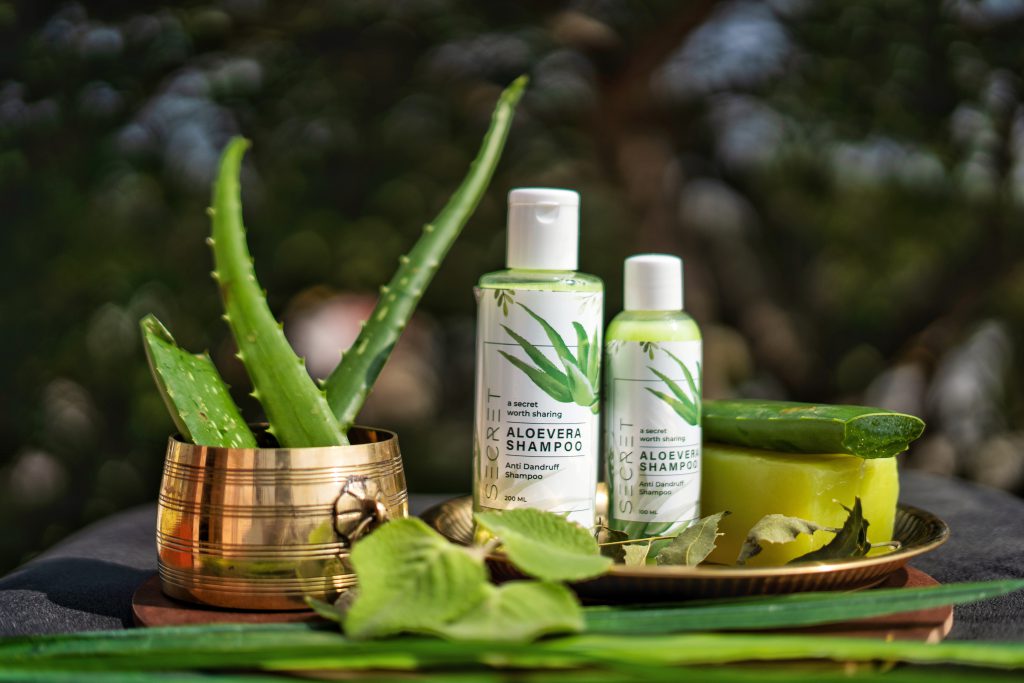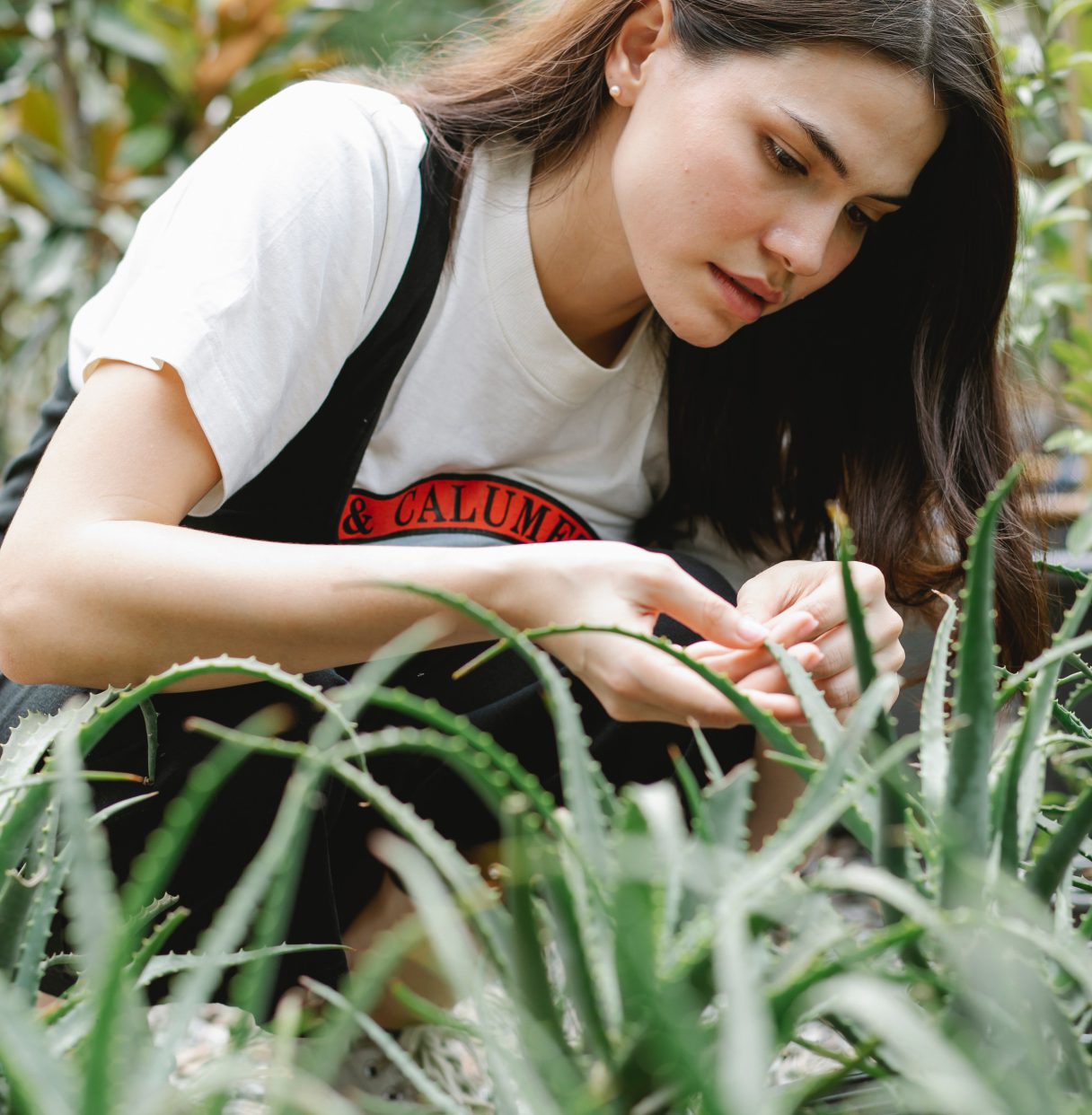What is aloe vera?
Aloe vera is a fatty plant belonging to the Liliaceae family, native to North and East Africa. This plant has been used for thousands of years for its medicinal properties and health benefits.
The aloe vera plant consists of thick, fleshy leaves that contain a transparent, viscous gel. This gel is rich in vitamins, minerals, amino acids, and other health-promoting components. Aloe vera is used for its anti-inflammatory, antiseptic, moisturizing and healing properties. Indeed, it is often used to treat burns, sunburns, and other skin conditions. By applying aloe vera gel to the skin, it can help reduce inflammation and irritation, as well as promote wound healing. Aloe vera is also used to treat acne, eczema, psoriasis, and other skin conditions.
In addition, this fatty plant is often used to aid digestion and relieve symptoms of constipation. It can help soothe stomach and intestinal irritations, as well as stimulate the production of digestive juices.
Finally, it is also used in cosmetics for its moisturizing and anti-ageing properties. Many skin and hair care products contain aloe vera to help moisturize and nourish the skin and hair, as well as reduce the signs of ageing.
The health benefits of aloe vera
- Promotes digestion: Aloe vera is often used to relieve digestive problems, such as constipation and bloating. Aloe vera gel can help soothe irritation in the stomach and intestines, as well as stimulate the production of digestive juices. It can also help reduce inflammation and promote healing of stomach ulcers.
- Improves skin health: This herb is often used to treat skin problems, such as acne, eczema, and psoriasis. Its gel helps to reduce inflammation and irritation of the skin, as well as promote the healing of wounds and burns. It is a good solution for moisturizing the skin and reducing the signs of ageing, such as wrinkles and dark spots.
- Strengthens the immune system: Rich in antioxidants and nutrients, aloe vera strengthens the immune system. Antioxidants help protect the body from free radicals, which can cause cell damage and lead to chronic disease.
- Promotes weight loss: It is also your ally in weight loss, as it improves digestion and reduces inflammation. When inflammation is reduced, it can help reduce cravings and sugar cravings, which can contribute to healthy weight loss.
- Lowers blood sugar: Finally, aloe vera leads to lower blood sugar levels by improving insulin sensitivity. When insulin is better regulated, it can help reduce the risk of developing chronic diseases, such as type 2 diabetes.
- All in all, aloe vera is a plant rich in health-promoting nutrients. It can help promote digestion, improve skin health, boost the immune system, promote weight loss and reduce blood sugar levels. With its many health benefits, it’s no wonder aloe vera is so popular around the world.
Aloe vera for the skin
The moisturizing, soothing and nourishing properties of aloe vera make it an excellent ingredient for skin care products, especially for facial care. Find out why aloe vera is good for facial care:
- Moisturizes the skin: Aloe vera is rich in polysaccharides, which act as natural moisturizers for the skin. Applying it to the face can help moisturize and soften dry skin.
- Soothes sensitive skin: It has soothing and anti-inflammatory properties that calm sensitive and irritated skin. It is therefore often a recommended treatment for acne, rashes, and sunburn.
- Deeply nourishes the skin: Aloe vera contains essential vitamins and minerals, such as vitamin E, zinc and magnesium, which can help nourish the skin deeply. These nutrients help keep skin healthy and prevent signs of premature aging.Reduces spots and scars: Regular application of aloe vera can help even out skin tone and reduce the appearance of acne scars.
- Stimulates collagen production: Collagen is an essential protein for the skin that helps maintain its firmness and elasticity. Aloe vera contains amino acids that can help stimulate collagen production in the skin.
- Protects the skin from free radicals: It is also rich in antioxidants, which can help protect the skin from free radicals. Free radicals are unstable molecules that damage skin cells and can contribute to premature aging.
This makes aloe vera an excellent ingredient for skin care products, especially for facials. Whether you want to moisturize, soothe or nourish your skin, aloe vera can help you achieve your goals. Try incorporating aloe vera into your skin care routine and you’ll notice an improvement in the appearance and health of your skin.


Aloe vera for hair
In addition to its beneficial properties for the skin, aloe vera will help you improve the health and appearance of your hair.
- Moisturizes hair: As with the skin, applying aloe vera to the hair can help moisturize and soften it.
- Deeply nourishes hair: Aloe vera is also rich in essential vitamins and minerals, such as vitamin E and zinc, which can help to deeply nourish hair. These nutrients help maintain hair health and prevent split ends.
- Promotes hair growth: It contains enzymes that stimulate hair growth. These enzymes help remove dead skin cells from the scalp, which promotes better blood circulation and faster hair growth.
- Reduces itchy scalp: Aloe vera has soothing and anti-inflammatory properties that can help relieve itchy scalp. It is therefore often used to treat dry and irritated scalp problems.
- Repairs damaged hair: It also contains amino acids that can help repair damaged and brittle hair. It can help strengthen hair structure and prevent breakage.
- Balances scalp pH: Finally, it is pH neutral, making it ideal for balancing the pH of the scalp. A balanced scalp can help prevent dandruff and oily hair.
By incorporating aloe vera into your hair care routine, you can help moisturize, nourish, and strengthen your hair, while promoting hair growth. Try applying an aloe vera hair mask once a week to reap the benefits for your hair. You can also find aloe vera-based shampoos and conditioners in hair care shops to add this super ingredient to your daily hair routine.
The disadvantages of aloe vera
Although aloe vera is known for its many health benefits, it is important to remember that it can also have some drawbacks for some people. If you are considering using aloe vera for its health benefits, it is important to consult your doctor and choose a quality product to avoid any potential side effects.
Here are some of the disadvantages of aloe vera:
- Risk of allergic reactions: As with any other natural product, some people may be allergic to aloe vera. Symptoms of an allergic reaction can include redness, itching, rash and breathing difficulties. If you are allergic to plants in the Liliaceae family, it is recommended that you avoid using aloe vera.
- Laxative effects: Aloe vera can have laxative effects if consumed in large quantities. This can lead to diarrhea, stomach cramps and nausea. It is important to follow the recommended doses to avoid any adverse effects.
- Drug interactions: It may interact with some medicines, especially anti-diabetic, and heart medicines. If you are taking medication, it is important to consult your doctor before consuming aloe vera.
- Adverse skin reactions: When applied to the skin, aloe vera gel can sometimes cause irritation, redness and itching. It is important to do a patch test before using aloe vera on a large area of skin.
- Bacterial contamination: When aloe vera is extracted from the leaves, it can be contaminated with bacteria, molds or other pathogens. It is therefore important to choose a quality product to avoid any risk of contamination.
Our tips for using aloe vera
- Choose a quality product: If you want to use aloe vera for its health benefits, it is important to choose a quality product. You can buy it as a gel, juice, capsule, or powder. Make sure you choose a high quality, organic product for best results.
- Use pure aloe vera gel: If you have an aloe vera plant at home, you can extract the gel from its leaves for immediate use. Simply cut a leaf and remove the gel-like pulp. Pure aloe vera gel can be applied directly to the skin to relieve burns, rashes, and other irritations.
- Using aloe vera in skin care: Aloe vera gel can be added to your skin care routine to moisturize and soothe the skin. You can use it as a face mask or as a moisturizing body lotion. Aloe vera can also be mixed with other natural ingredients to create customized skin care products.
- Consume aloe vera as juice: Aloe vera juice can be consumed for its health benefits. It is often mixed with other fruit juices to create tasty and healthy drinks. It is recommended to consume aloe vera juice in small amounts to avoid any laxative effect.
- Follow recommended dosages: If you are taking aloe vera supplements in capsule or powder form, be sure to follow the recommended dosage instructions on the package. It is important not to exceed the recommended dosage to avoid unwanted side effects.
In summary, aloe vera can be used in a variety of ways to take advantage of its health benefits. Whether it’s for the skin, digestion, or immune system, it’s important to choose a quality product and follow the recommended dosages for best results.
How do I care for my aloe vera at home?
Aloe vera is an easy-to-care-for, hardy plant that can be grown both indoors and outdoors. So, you can easily take care of it, even if you don’t have a green thumb. To help you, we offer you some tips on how to care for your aloe vera at home:
- Choose a suitable location: This plant needs exposure to direct sunlight for at least 6 hours a day. So, choose a bright, sunny spot for your plant.
- Use a well-draining soil: Choose a well-draining potting soil, for example a mixture of potting soil and sand, to facilitate drainage.
- Water regularly but sparingly: Aloe vera does not need to be watered frequently, as it is able to store water in its fleshy leaves. Wait until the soil is dry before watering your plant, and then water it sparingly.
- Avoid overwatering: Your plant can rot if its roots are left in water for too long. So, make sure your pot has a drainage hole to get rid of excess water.
- Trim dead leaves: Dead leaves can be trimmed with clean scissors to encourage new leaf growth.
- Fertilize your plant: Aloe vera can benefit from a diluted liquid fertilizer every month during the growing season (March to September).
- Watch out for pests and diseases: Mealy bugs and mites can attack leaves, so it’s important to monitor your plant regularly and treat any infestation or disease promptly.
By following these tips, you can easily maintain your aloe vera at home and enjoy its many health benefits.





